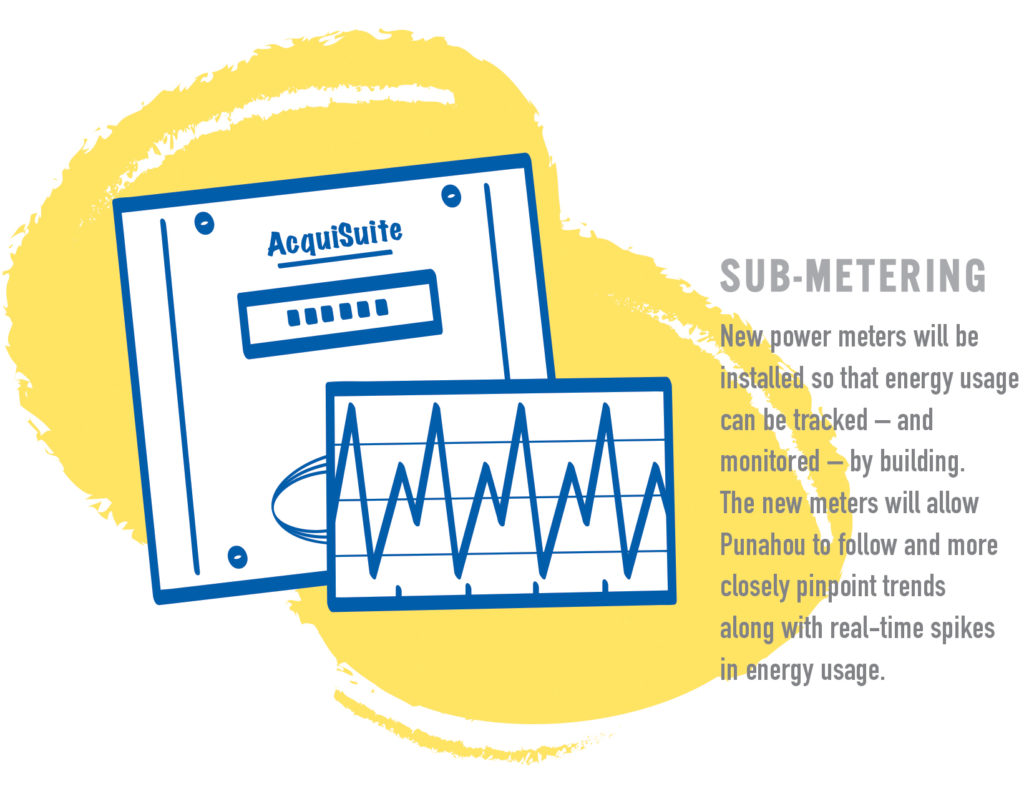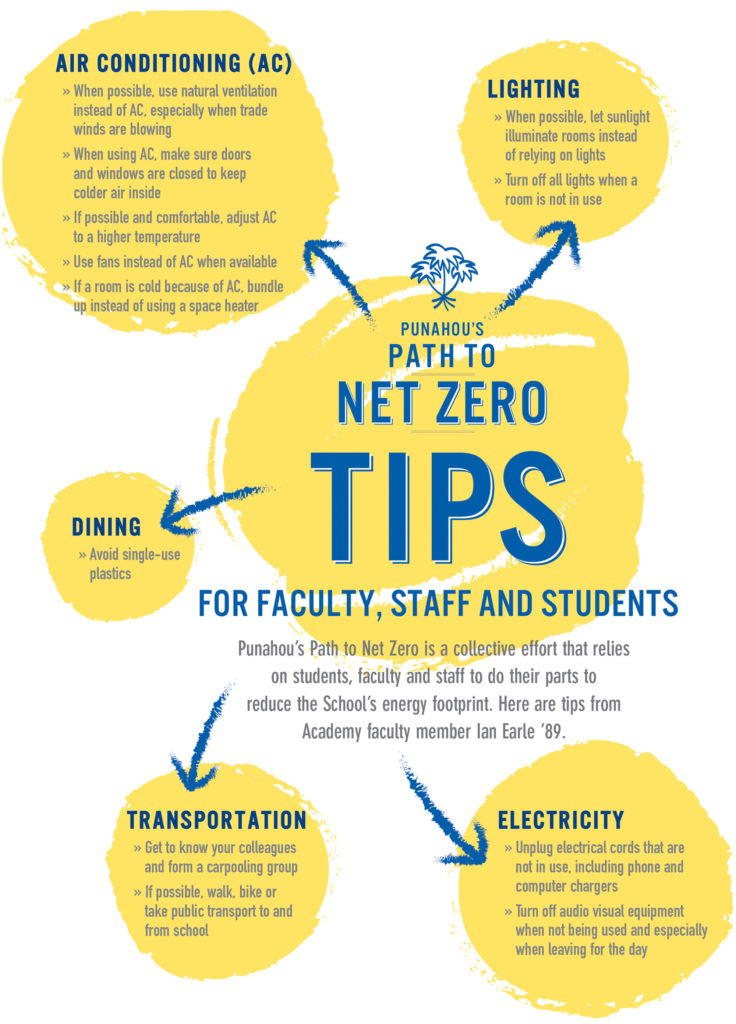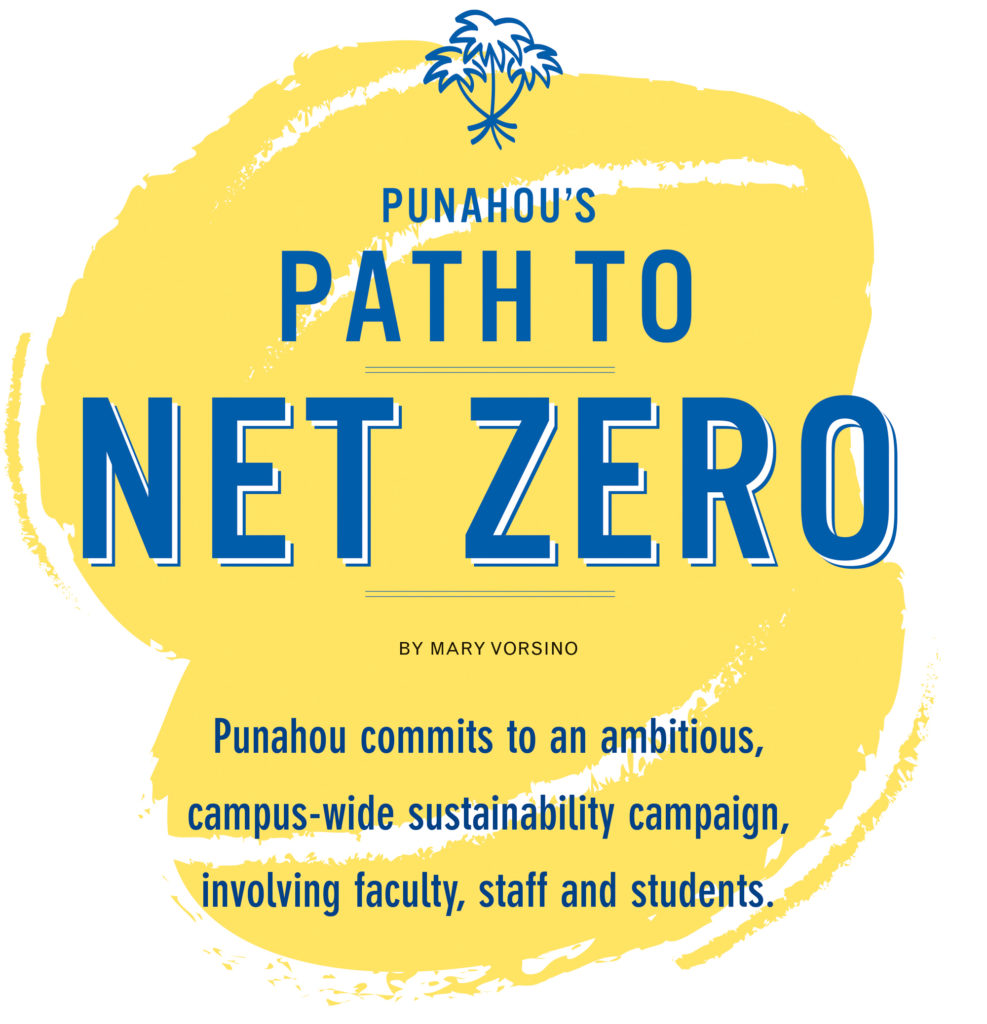
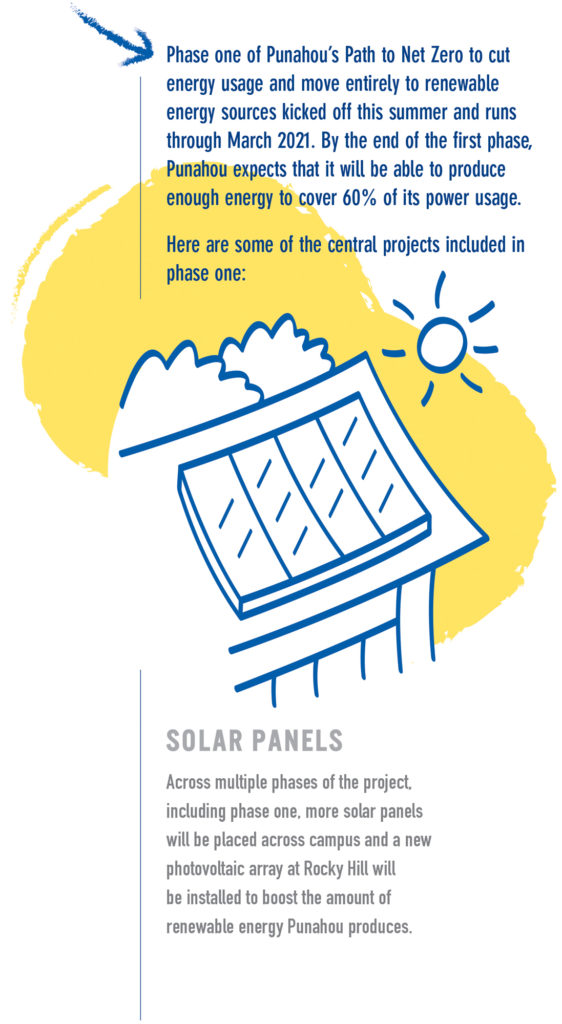
Monumental changes are underway across Punahou’s campus – projects with an ambitious end goal. By 2025, Punahou aspires to become a Net Zero school, meaning the School will consume only as much energy as produced.
This multi-year sustainability campaign, dubbed the Path to Net Zero, is a high priority for the School, says President Mike Latham ’86. “We’re seeing a generation of kids who are deeply invested in this issue, and the idea that we have to be responsible custodians for the resources that we use is something our students are teaching us. A very clear demand is being made by students, which is great.”
The Path to Net Zero, which kicked off this past summer, has a two-pronged goal: Wean the campus from fossil fuels and cut its energy footprint. The first phase includes the installation of new meters for buildings so that energy usage can be more closely monitored; retrofitted LED lighting; more energy-efficient air conditioning systems coupled with high-powered fans; and solar power systems that will triple photovoltaic production within two years.
None of these improvements will mean much if habits aren’t changed, too. That’s why the sustainability programs include a significant push to turn the Net Zero upgrades into an environmental awareness movement where everyone has a stake.
Academy faculty member Ian Earle ’89, a project leader for the effort, envisions Net Zero popping up in various ways around campus. He wants to see teachers being more deliberate about their own classroom energy practices and students taking on big projects that incorporate green design elements.
Overall, the journey should be a shared one, Earle says. “It’s a School-wide initiative for positive change that links administrators, faculty, staff and students,” he says. “As a community working together, the realization of this goal will have significant impact on our green-house gas emissions that will reverberate beyond our campus, benefiting the larger community and beyond.”
Punahou launched the Path to Net Zero after three years of planning, but the School has long been a trailblazer of sustainable practices. Case Middle School, which opened in 2004, won the first LEED Gold designation in Hawai‘i, with its cutting-edge sustainable design. The Omidyar K – 1 Neighborhood went even further, implementing extensive photovoltaics and other measures that earned the facility a LEED Platinum designation. The Sidney and Minnie Kosasa Community for Grades 2 – 5, the School’s newest learning environment, has reached an even greater goal, achieving Net Zero status at its onset.
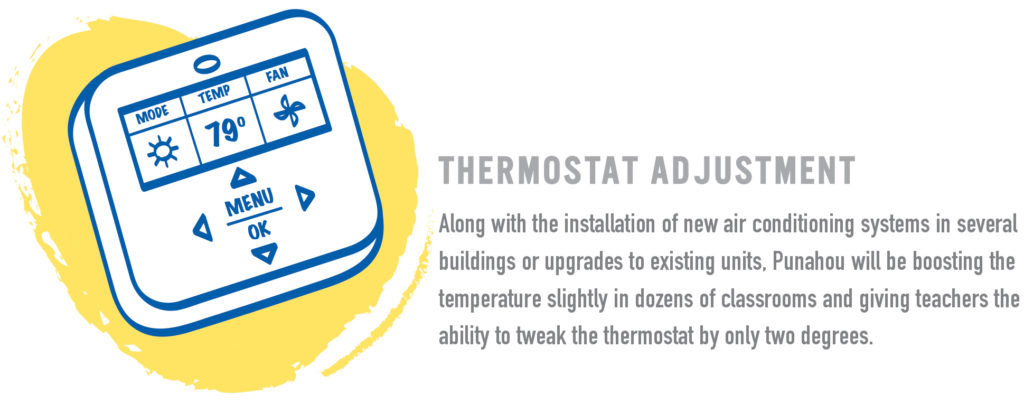
The School’s ambition for campus-wide sustainability was fueled after the construction of the Omidyar Neighborhood, which was designed so that more than half of its electricity consumption would come from photovoltaic panels. A year-long review had a surprising result. The School found that the solar panels were covering 93% of all electricity usage in the complex. In other words, the complex was nearly off the grid.
That review discovered another important conclusion. The Neighborhood wasn’t just environmentally friendly by design. It turned out good habits were playing a part, too. Teachers there were, and still are, making a conscious choice every day to run their air conditioning systems less and use more natural ventilation. Children have also developed eco-focused habits from such a young age that they are now ingrained in the classroom culture.
It’s behavior like that that inspires Earle. He noted that the K – 1 Neighborhood has very visible displays in classrooms that let teachers and students know when it’s cool enough to turn off the AC. The display triggers a conversation, he said, and students understand the benefits of making adjustments.
He wants to see those conversations happening in more classrooms and considerations of energy usage showing up in more day-to-day decisions.
Students and teachers across campus are now weaving the key principles of Net Zero into
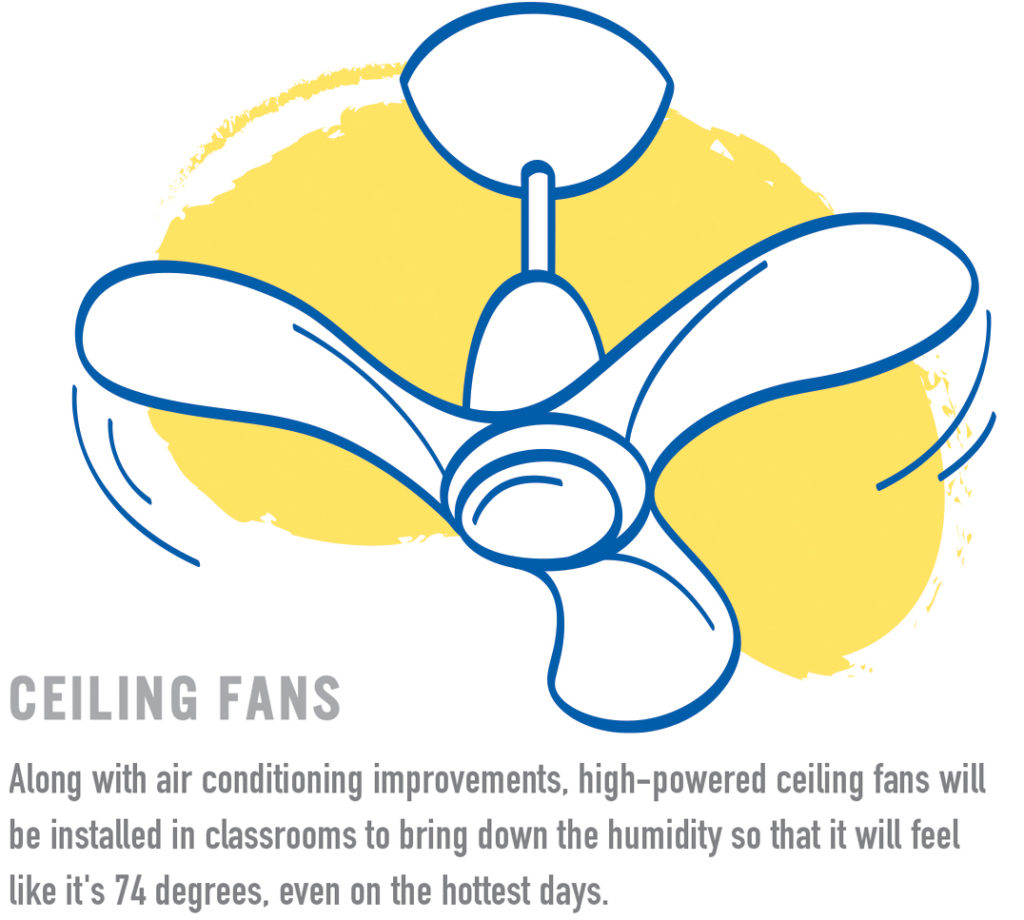
classroom teaching. The School is also considering other projects, from an energy and sustainability lab on campus that would feature a recycling
center to small-scale wind turbines for buildings.
The first phase of the Path to Net Zero includes air conditioning upgrades and the installation of new, high-powered ceiling fans in dozens of classrooms. The temperatures in those classrooms will be set a little higher because the fans will help circulate air and keep things cool – at a “feels like” temperature of 74 degrees.
Teachers in classrooms will also have the ability to turn off their air conditioners whenever the weather permits, and will be encouraged to do so, but will only be able to change the temperature setting when the AC is on by two degrees.
The Idea: Build Better Habits
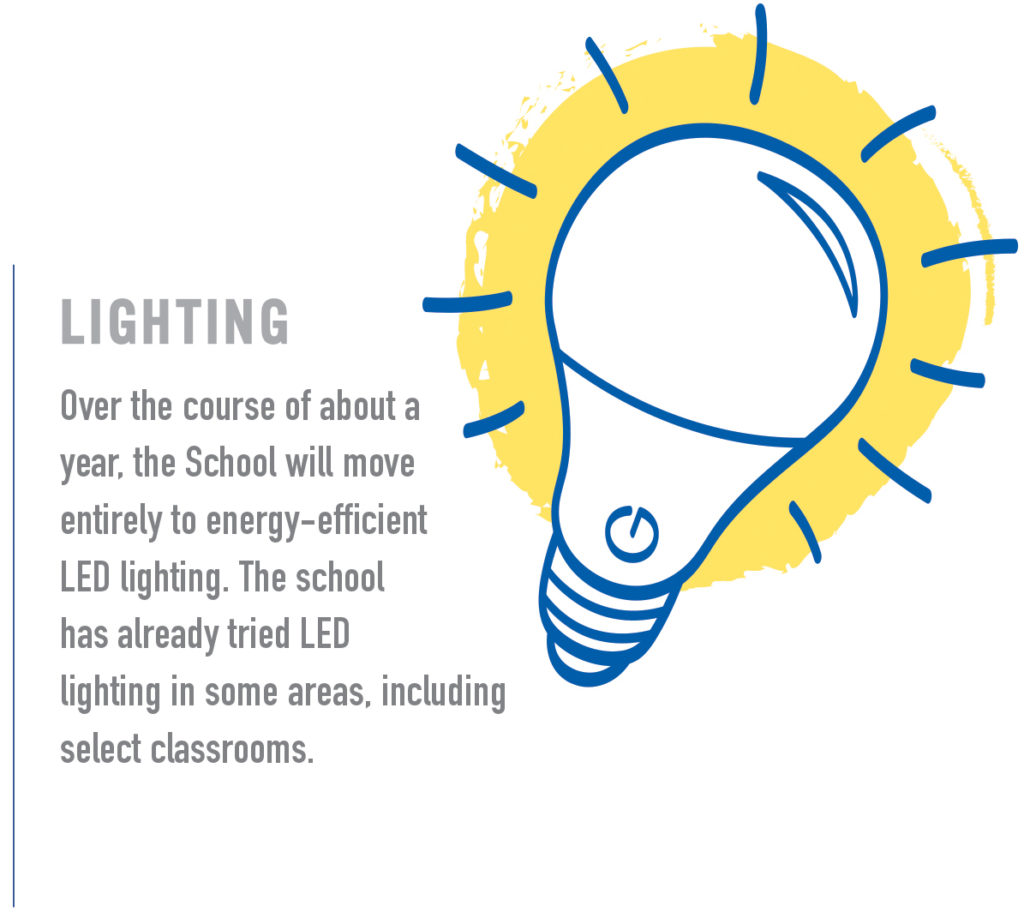
By the end of phase one in 2021, Punahou is expected to be about 60% off the grid. In 2025, the campus could be producing 90% to 99% of its own energy – all renewable.
A big part of that move to renewable energy will be the installation of more solar power systems across campus, including a photovoltaic array at Rocky Hill, scheduled for 2020.
Arrays at Rocky Hill will be installed over multiple phases, and to keep the grass around the photovoltaic panels short, the School is considering bringing in goats to serve as “natural lawnmowers,” which would simultaneously offer a fun learning experience for students. PV panels also are planned for the deck area of the Waterhouse Pool this year.
Overall, the School’s goal of Net Zero may seem like a “pie in the sky” idea, but Earle said it’s actually quite practical and illustrates how far Punahou has come. “If Punahou can achieve Net Zero, it will show other institutions, other businesses, they can do it,” he says. “If Punahou is willing to try to do it, it means it’s worthwhile enough, money savings aside, to make this happen.”
